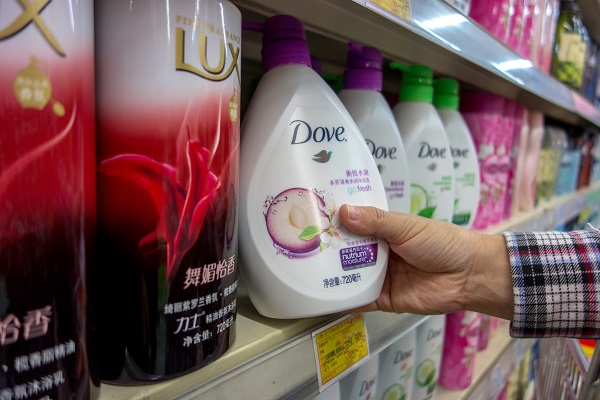Sector Screener: a potent mix of growth potential and defensive appeal
26th June 2023 11:33
by Robert Stephens from interactive investor
These companies offer a combination of growth and relative stability in an uncertain period for the global economy. Columnist Robert Stephens believes this is an attractive opportunity for long-term investors.

The world economy is in the midst of a highly challenging period. Rampant inflation across developed economies has prompted fast-paced interest rate rises that act as a drag on GDP growth. Indeed, having expanded by 3.2% last year, the OECD forecasts that the global economy will grow by only 2.7% in the current year.
- Invest with ii: Share Dealing with ii | Top UK Shares| Cashback Offers
As a result, the near-term prospects for multinational consumer-focused companies are uncertain. This is reflected in the recent performance of the FTSE 350 Personal Care, Drug & Grocery Stores sector, which has posted a 1% decline since the start of the year. It contains several large, global consumer goods firms such as Reckitt Benckiser (LSE:RKT) and Unilever (LSE:ULVR), which between them sell a wide range of personal and household items.
Alongside their US-listed peer Procter & Gamble Co (NYSE:PG) they offer a potent mix of defensive qualities and long-term growth potential, as well as sound fundamentals, that equate to a highly favourable risk/reward opportunity for investors.
Growth prospects
Of course, the world economy’s performance is set to improve. The OECD, for example, expects global GDP growth to accelerate from 2.7% this year to 2.9% in 2024. A key catalyst is likely to be a moderation of inflation that has already started to take place across developed economies. In the US, for instance, annual inflation has dropped from a 41-year high of 9.1% in June last year to 4% last month. In the Eurozone, meanwhile, the rate of annual price growth has declined from an all-time high of 10.6% in October 2022 to 6.1% in May.
While inflation rates in both regions remain higher than target levels, interest rate rises are likely to slow or even abate in the coming months, as central banks allow for the presence of time lags following monetary policy changes. An end to the rate tightening cycle, and even a modest fall in borrowing costs in time, is likely to have a positive impact on the world economy’s growth rate. In turn, this will lead to operating conditions that are more conducive to growth for global consumer goods companies.
- Sector Screener: three travel & leisure shares with long-term appeal
- Insider: Tullow Oil and GSK directors spend heavily on shares
Unilever, Reckitt and Procter & Gamble have substantial exposure to emerging economies that are set to generate strong GDP growth rates in the current year and next year. For example, China’s economy is expected to expand by 5.4% this year and by a further 5.1% next year as it benefits from the end of its zero-Covid policy. India’s economy, meanwhile, is set to grow by 6% in 2023 and by 7% in 2024. Alongside an improving outlook for the developed world as inflation moderates and interest rates plateau, the emerging world is set to catalyse the financial performance of global consumer goods companies.
Defensive appeal
Clearly, the length of time it takes for inflation to fall to target levels and for interest rate rises to abate is a known unknown. As a result, the prospects for the world economy are likely to remain decidedly uncertain over the coming months.
Should inflation remain sticky, Unilever, Reckitt and P&G are likely to be in a good position. Their brands benefit from extremely strong customer loyalty that allows them to pass on higher input costs to consumers via price rises. This means their profit margins are unlikely to be squeezed should the current period of heightened inflation persist.
- Richard Beddard: a friendly company in better health than ever
- UK banks among stocks in trouble after latest inflation shock
Separately, many of the products sold by the three companies are viewed as staple goods by consumers. For example, demand for cleaning products and medication is likely to be relatively unaffected by a challenging economic outlook. When combined with the size, scale and breadth of the three companies, both with regards to their product portfolios and geographical spread, they have defensive characteristics that equate to less risk for investors.
Indeed, a period of economic turbulence, which cannot be ruled out while inflation remains high and interest rates are rising, may prompt greater demand among investors for large global consumer companies in the Personal Care sector. Their perceived safe-haven status could boost the sector’s performance relative to other industries.

| Company | Price | Market Cap (m) | Shares in 2023 (%) | Shares in 2022 (%) | One-year performance (%) | Forward PE | Current Dividend Yield (%) | Forward Dividend Yield (%) |
| Unilever | £40.72 | £102,480 | -2.6 | 6.0 | 9.0 | 18.6 | 3.6 | 3.6 |
| Reckitt Benckiser | £60.79 | £43,616 | 5.6 | -9.3 | -2.7 | 17.9 | 3.0 | 3.1 |
| Procter & Gamble | $148.46 | $349,951 | -2.1 | -7.3 | 2.8 | 25.3 | 2.4 | 2.5 |
| Source SharePad. Data as at 26 June 2023. | ||||||||
Unilever
As well as offering long-term growth potential and defensive qualities, Unilever, Reckitt and P&G have sound fundamentals. Shares in Unilever, for example, now offer far better value for money than they did several years ago. Trading 22% down on their five-year high from August 2019, they now have a relatively undemanding price/earnings (PE) ratio of just over 18.
The owner of brands such as Dove, Domestos and Knorr also has a solid financial position. Its net interest payments were covered 17 times by operating profit last year, which shows it can endure a period of weaker profitability without coming under financial strain. And with 60% of the company’s sales being derived from emerging markets, it is well placed to capitalise on their strong growth prospects over the coming years.
Unilever’s first-quarter underlying sales growth of 10.5% highlights its strong performance despite an uncertain economic outlook. Although a change in CEO on 1 July may bring a strategy shift, the company’s sound balance sheet, growth opportunities and fair valuation mean it offers significant investment appeal.
Reckitt Benckiser
Sector peer Reckitt’s latest quarterly trading update showed that like-for-like sales grew by 7.9%. Its focus on hygiene, health and nutrition brands such as Dettol, Gaviscon and Finish means it offers defensive appeal because they’re consumer staples. Furthermore, it was able to raise prices by over 12% year-on-year in the first quarter in response to higher input costs.
- Fundsmith buys world’s largest consumer goods company – again
- Stockwatch: kicking the tyres of a classic value investment
Trading 22% lower than their five-year high from July 2020, the company’s shares now have a PE ratio of 18. This suggests they offer fair value for money given the company’s long-term growth potential as consumer disposable incomes grow amid a global economic recovery. And with a net debt-to-equity ratio of 82%, the company’s balance sheet is not overly stretched in an era of interest rate rises.
With a new CEO having recently been appointed, Reckitt’s strategy could change to some degree over the medium term. However, given its broad range of high-quality brands and solid fundamentals, it has the key ingredients to deliver improving financial performance across a range of economic conditions.
Procter & Gamble
Unlike Unilever and Reckitt, which are UK-listed companies, shares in Procter & Gamble are listed in the US. However, its range of brands includes familiar UK household names such as Flash, Gillette and Vicks. Over the past four years, they have contributed to a 12% annualised growth rate in the company’s earnings per share.
Having raised dividends for 67 consecutive years, the stock offers income investing appeal that is not immediately evident in its 2.5% yield. Although Procter & Gamble has a rather rich PE ratio of around 25, it is well placed to deliver capital growth following a 93% share price gain in the past five years. With China accounting for 10% of its sales last year, and economies across Asia, Africa and South America contributing a further 20% of revenue, it is set to capitalise on growing consumer demand for its products.
Alongside Reckitt and Unilever, the company offers an appealing mixture of growth potential and relative stability amid an uncertain period for the global economy. With all three stocks having solid fundamentals, they provide an attractive risk/reward opportunity for long-term investors.
Robert Stephens is a freelance contributor and not a direct employee of interactive investor.
These articles are provided for information purposes only. Occasionally, an opinion about whether to buy or sell a specific investment may be provided by third parties. The content is not intended to be a personal recommendation to buy or sell any financial instrument or product, or to adopt any investment strategy as it is not provided based on an assessment of your investing knowledge and experience, your financial situation or your investment objectives. The value of your investments, and the income derived from them, may go down as well as up. You may not get back all the money that you invest. The investments referred to in this article may not be suitable for all investors, and if in doubt, an investor should seek advice from a qualified investment adviser.
Full performance can be found on the company or index summary page on the interactive investor website. Simply click on the company's or index name highlighted in the article.
Disclosure
We use a combination of fundamental and technical analysis in forming our view as to the valuation and prospects of an investment. Where relevant we have set out those particular matters we think are important in the above article, but further detail can be found here.
Please note that our article on this investment should not be considered to be a regular publication.
Details of all recommendations issued by ii during the previous 12-month period can be found here.
ii adheres to a strict code of conduct. Contributors may hold shares or have other interests in companies included in these portfolios, which could create a conflict of interests. Contributors intending to write about any financial instruments in which they have an interest are required to disclose such interest to ii and in the article itself. ii will at all times consider whether such interest impairs the objectivity of the recommendation.
In addition, individuals involved in the production of investment articles are subject to a personal account dealing restriction, which prevents them from placing a transaction in the specified instrument(s) for a period before and for five working days after such publication. This is to avoid personal interests conflicting with the interests of the recipients of those investment articles.